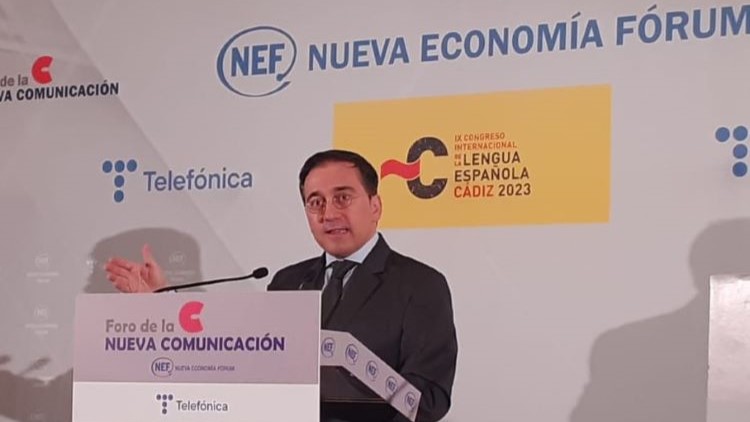Eduardo González
The Minister of Foreign Affairs, José Manuel Albares, said yesterday that he was convinced that the IX International Congress of the Spanish Language (CILE), which will take place in Cadiz between March 27 and 30, will be a “success” because it represents the importance of a language that “is not the heritage of anyone and is one of the great strengths that we Spanish speakers have”.
“There are few languages that are truly universal, and Spanish is one of them”, declared Albares during an informative breakfast organized in Madrid by New Economy Forum to present the IX International Congress of the Spanish Language (CILE), which will be inaugurated by the King and Queen of Spain in Cadiz on March 27. The Minister was accompanied at the event by the director of the Instituto Cervantes, Luis García Montero, and the director of the Royal Spanish Academy and president of the Association of Spanish Language Academies (ASALE), Santiago Muñoz Machado.
After thanking Peru for its efforts to organize the CILE in the city of Arequipa (which it was forced to renounce due to the political instability generated by the self-coup of Pedro Castillo), Albares recalled that the ninth edition of the Congress will be the first that can be followed in its entirety on the Internet, in a sign that “the future of Spanish is being played in the digital world”.
He also stressed that the Congress will be held “just 24 hours after the Ibero-American Summit concludes and a few months before the expected EU-CELAC Summit, after eight long years, too long a period of absence of a bi-regional meeting at the highest level”. All this, he said, is a reflection of the fact that Spain’s “absolute priority is its relationship with Latin America and with the entire Iberian world”.
Albares also recalled that Spanish is the official language in twenty countries, 18 in Latin America (the other two are Spain and Equatorial Guinea, which he thanked for its work to make Spanish the working language in the AU), that Spanish is “the second mother tongue in the world, with 500 million speakers”, and the “fourth most spoken language by number of speakers, with 600 million”. In addition, he continued, “24 million students study Spanish as a foreign language, and this figure is growing steadily”, and “8% of Internet users use Spanish, which is the third language on the Internet, only behind English and Chinese”.
In addition to all this, he continued, “the economic dimension and the economic and commercial potential of Spanish”. “Spanish-speaking countries generate more than six percent of the world’s GDP” and the existence of a common language “facilitates commercial exchanges and economic flows,” he said. In addition, Spanish is “the fourth language in terms of titles published” and two Spanish-speaking countries, Spain and Argentina, are “among the top 15 book producers in the world,” he added.
For all these reasons, he announced, one of the objectives of the Ministry of Foreign Affairs is “to consolidate Spanish as prestigious language of diplomacy”, because having a common language “makes it easier to communicate and to convey a vision of the world, values and a way of perceiving international relations”. “We are confident in having Spanish as a leading language in diplomacy and international relations” in a context in which, because of the war in Ukraine, “foreign policy and diplomacy affect the interests of citizens,” he said.
An example of the rise of Spanish in the world of diplomacy, he pointed out, is the recent decision of the Hague Conference on Private International Law (made up of 90 member states) to adopt Spanish as an official language, together with English and French. Likewise, he announced, the Government is working to have Spanish “declared a working language” at the International Court of Justice (ICJ, the court in charge of settling disputes between countries). “It is a just cause, because a third of the ICJ cases have involved Spanish-speaking countries,” which are forced into the “nonsense” of litigating against each other in English and French.
Muñoz Machado and García Montero
At the same meeting, Santiago Muñoz Machado described as “heroic” the decision and capacity of the Spanish Government to take over the CILE after Peru’s resignation. Likewise, and in response to a question from the audience, he expressed his wish that the Government of Daniel Ortega “rectify” the “monumental nonsense” of closing the Nicaraguan Academy of the Language for not registering in the registry of “foreign agents” together with some local NGOs.
Apart from this, Muñoz Machado assured that Spanish “is not in danger” in the region, where it is spoken by between 80% and 90% of its inhabitants, and warned that in Spain there is “inaccurate information” about the alleged anti-Spanish policies of certain Ibero-American governments. “Some important governments start from a new American constitutionalism that strengthens the traditions, laws, ways of thinking and languages of the original peoples, which seems very good to us because some of them are at risk of disappearing”, he added.
For his part, Luis García Montero defended, quoting the Venezuelan intellectual Andrés Bello (1781-1865), the “full sovereignty of each nation without endangering the common treasure of language” and lamented that in Spain itself “four official languages coexist, sometimes stained by absurd political discussions”. Likewise, he affirmed that, after a 20th century full of wars, gas chambers and coups d’état, and with a 21st century that “in only 23 years has already equaled” the 20th century, “to demand an account of the 15th and 16th centuries is to set absurd traps”.
Among those attending the event were the State Secretary for Ibero-America, the Caribbean and Spanish in the World, Juan Fernández Trigo; the President of La Rioja, Concha Andreu (who briefly presented the Global Observatory of Spanish, attached to the Instituto Cervantes, based in the Language Valley); the Ombudsman, Ángel Gabilondo; the special commissioner for the Alliance for a New Language Economy, Cristina Gallach, and numerous ambassadors.





